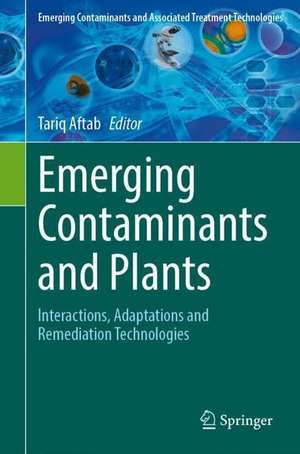Emerging Contaminants and Plants: Interactions, Adaptations and Remediation Technologies: Emerging Contaminants and Associated Treatment Technologies
Editat de Tariq Aftaben Limba Engleză Hardback – 17 feb 2023
| Toate formatele și edițiile | Preț | Express |
|---|---|---|
| Paperback (1) | 789.42 lei 38-44 zile | |
| Springer International Publishing – 17 feb 2024 | 789.42 lei 38-44 zile | |
| Hardback (1) | 946.79 lei 43-57 zile | |
| Springer International Publishing – 17 feb 2023 | 946.79 lei 43-57 zile |
Preț: 946.79 lei
Preț vechi: 1154.62 lei
-18% Nou
Puncte Express: 1420
Preț estimativ în valută:
181.33€ • 186.82$ • 151.90£
181.33€ • 186.82$ • 151.90£
Carte tipărită la comandă
Livrare economică 24 februarie-10 martie
Preluare comenzi: 021 569.72.76
Specificații
ISBN-13: 9783031222689
ISBN-10: 3031222687
Pagini: 353
Ilustrații: IX, 353 p. 30 illus., 29 illus. in color.
Dimensiuni: 155 x 235 mm
Greutate: 0.69 kg
Ediția:1st ed. 2023
Editura: Springer International Publishing
Colecția Springer
Seria Emerging Contaminants and Associated Treatment Technologies
Locul publicării:Cham, Switzerland
ISBN-10: 3031222687
Pagini: 353
Ilustrații: IX, 353 p. 30 illus., 29 illus. in color.
Dimensiuni: 155 x 235 mm
Greutate: 0.69 kg
Ediția:1st ed. 2023
Editura: Springer International Publishing
Colecția Springer
Seria Emerging Contaminants and Associated Treatment Technologies
Locul publicării:Cham, Switzerland
Cuprins
Chapter1. An Insight into the Consequences of Emerging Contaminants in Soil and Water and Plant Responses.- Chapter2. Impact of emerging metal-based NPs on plants and their influence on the phytotoxicity of other pollutants.- Chapter3. Potential toxic effects of metal or metallic nanoparticles in plants and their detoxification mechanisms.- Chapter4. Non-standard physiological endpoints to evaluate the toxicity of emerging contaminants in aquatic plants: a case study on the exposure of Lemna minor L. and Spirodela polyrhiza (L.) Schleid. to dimethyl phthalate (DMP).- Chapter5. Pesticides: Impacts on Agriculture productivity, Environment and Management.- Chapter6. Occurrence, Distribution, and Fate of Emerging Persistent Organic Pollutants (POPs) in the Environment.- Chapter7. Phyco-remediation: Role of micro-algae in remediation of Emerging Contaminants.- Chapter8. Contamination of sewage water with active pharmaceutical ingredients: an emerging threat to food productsand human health.- Chapter9. Physiological and Molecular Mechanism of Nanoparticles Induced Tolerance in Plants.- Chapter10. Arsenic and cadmium toxicity in plants: mitigation and remediation strategies.- Chapter11. Remediation of persistent organic pollutants using advanced techniques.- Chapter12. Multiple adaptation strategies of plant to mitigate the phytotoxic effects of diverse pesticides and herbicides.- Chapter13. Carbon-based hybrid materials for remediation technology.
Notă biografică
Tariq Aftab received his Ph.D. in the Department of Botany at Aligarh Muslim University, India, and is currently an Assistant Professor there. He is the recipient of a prestigious Leibniz-DAAD fellowship from Germany, Raman Fellowship from the Government of India, and Young Scientist Awards from the State Government of Uttar Pradesh (India) and Government of India. After completing his doctorate, he has worked as Research Fellow at National Bureau of Plant Genetic Resources, New Delhi and as Post-doctorate Fellow at Jamia Hamdard, New Delhi, India. Dr. Aftab also worked as Visiting Scientist at Leibniz Institute of Plant Genetics and Crop Plant Research (IPK), Gatersleben, Germany, and in the Department of Plant Biology, Michigan State University, USA. He has edited 15 books with with international publishers, co-authored several book chapters, and published over 70 research papers in peer-reviewed international journals. His research interests include physiological, proteomic, andmolecular studies on medicinal and crop plants.
Textul de pe ultima copertă
Emerging contaminants (ECs) are predominantly unregulated anthropogenic chemicals that occur in air, soil, water, food, and plant/animal tissues in trace concentrations. ECs are persistent in the environment, capable of perturbing the physiology of target receptors and, therefore, are increasingly regarded as a subject of concern. This volume aims to enhance understanding of emerging contaminants’ effects on plants and the environment and to highlight and address the need of sustainable and eco-friendly approaches in mitigating and remediating the effects of ECs. The book comprises chapters from diverse areas dealing with biotechnology, microbial technology, nanotechnology, molecular biology, remediation, and more. This volume will be useful to remediation practitioners, researchers, regulators and graduate students.
Caracteristici
Offers comprehensive background on emerging contaminants and their effects on plants Presents comprehensive coverage of metabolization and translocation of emerging contaminants by plants Covers phyto- and bio-remediation of contaminants by plants












